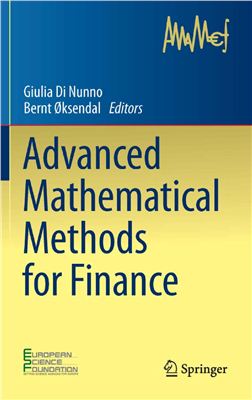Giulia Di Nunno, Bet Oksendal. Advanced Mathematical Methods for
Finance. Springer, 2011. - 544 p. - ISBN: 3642184111
This book presents innovations in the mathematical foundations of financial analysis and numerical methods for finance and applications to the modeling of risk. The topics selected include measures of risk, credit contagion, insider trading, information in finance, stochastic control and its applications to portfolio choices and liquidation, models of liquidity, pricing, and hedging. The models presented are based on the use of Brownian motion, Levy processes and jump diffusions. Moreover, fractional Brownian motion and ambit processes are also introduced at various levels. The chosen blend of topics gives an overview of the frontiers of mathematics for finance. New results, new methods and new models are all introduced in different forms according to the subject. Additionally, the existing literature on the topic is reviewed. The diversity of the topics makes the book suitable for graduate students, researchers and practitioners in the areas of financial modeling and quantitative finance. The chapters will also be of interest to experts in the financial market interested in new methods and products. This volume presents the results of the European ESF research networking program Advanced Mathematical Methods for Finance.
This book presents innovations in the mathematical foundations of financial analysis and numerical methods for finance and applications to the modeling of risk. The topics selected include measures of risk, credit contagion, insider trading, information in finance, stochastic control and its applications to portfolio choices and liquidation, models of liquidity, pricing, and hedging. The models presented are based on the use of Brownian motion, Levy processes and jump diffusions. Moreover, fractional Brownian motion and ambit processes are also introduced at various levels. The chosen blend of topics gives an overview of the frontiers of mathematics for finance. New results, new methods and new models are all introduced in different forms according to the subject. Additionally, the existing literature on the topic is reviewed. The diversity of the topics makes the book suitable for graduate students, researchers and practitioners in the areas of financial modeling and quantitative finance. The chapters will also be of interest to experts in the financial market interested in new methods and products. This volume presents the results of the European ESF research networking program Advanced Mathematical Methods for Finance.

